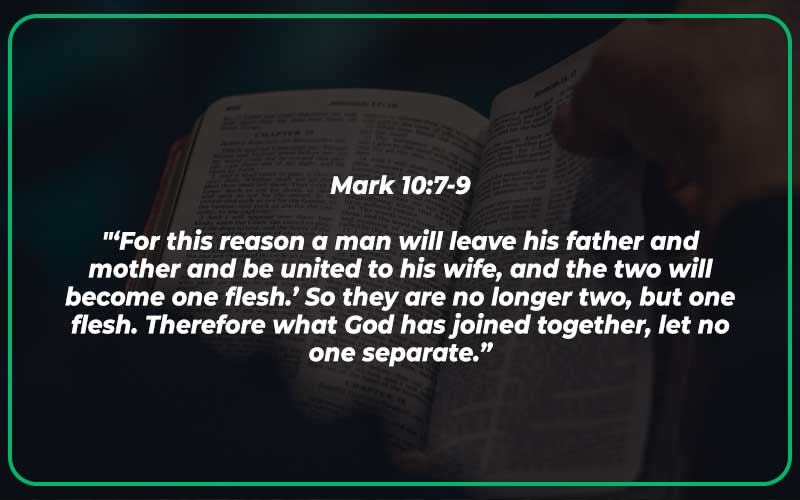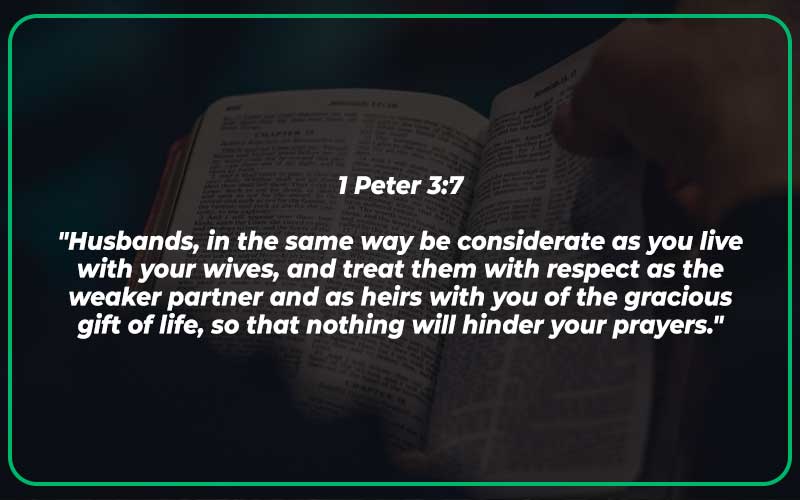The commitment to forsake all others is a sacred vow often made in the context of marriage. Journey with us through the pages of the Bible as we explore verses that shed light on the significance of faithfulness and loyalty.
Discover the divine wisdom within these scriptures and gain a deeper understanding of the importance of honoring commitments and the sanctity of the marital bond.
Also Read: 25 Bible Verses about I Will Bless the Lord at All Times (With Commentary)
Bible Verses about Forsaking All Others
Matthew 19:5-6
“’For this reason a man shall leave his father and mother and be joined to his wife, and the two shall become one flesh’? So they are no longer two, but one flesh. Therefore what God has joined together, let no one separate.”
This passage from Matthew emphasizes the sanctity of marriage and the importance of forsaking all others to fully commit to one’s spouse. It stresses the unity and oneness that is created in marriage when a man and a woman come together in holy matrimony.
Proverbs 5:15-17
“Drink water from your own cistern, running water from your own well. Should your springs overflow in the streets, your streams of water in the public squares? Let them be yours alone, never to be shared with strangers.”
In this passage from Proverbs, the author uses the metaphor of water to represent sexual intimacy and urges the reader to keep that intimacy exclusive to their own spouse. The language emphasizes the importance of fidelity and staying committed to one’s partner.
1 Corinthians 7:2-5
“But because of the temptation to sexual immorality, each man should have his own wife and each woman her own husband. The husband should give to his wife her conjugal rights, and likewise the wife to her husband. For the wife does not have authority over her own body, but the husband does. Likewise the husband does not have authority over his own body, but the wife does. Do not deprive one another, except perhaps by agreement for a limited time, that you may devote yourselves to prayer; but then come together again, so that Satan may not tempt you because of your lack of self-control.”
In this passage from 1 Corinthians, Paul emphasizes the importance of sexual fidelity within marriage. He encourages husbands and wives to fulfill each other’s needs, recognizing that their bodies belong to each other and must not be taken for granted or used selfishly. The phrase “do not deprive one another” emphasizes the importance of commitment and communication in maintaining a healthy and faithful marriage.
Hebrews 13:4
“Let marriage be held in honor among all, and let the marriage bed be undefiled, for God will judge the sexually immoral and adulterous.”
In this verse from Hebrews, the author reinforces the idea that marriage is a sacred institution and should be respected by all. The phrase “let the marriage bed be undefiled” emphasizes the importance of faithfulness and sexual purity within marriage. The warning of God’s judgment serves as a reminder of the seriousness of breaking the marriage covenant.
Malachi 2:16
“For the man who does not love his wife but divorces her, says the Lord, the God of Israel, covers his garment with violence, says the Lord of hosts. So guard yourselves in your spirit, and do not be faithless.”
In this passage from Malachi, the Lord speaks against the sin of divorce and emphasizes the importance of loving one’s spouse. The language of violence and covering one’s garment with it connotes the seriousness of breaking the marriage covenant. The command to “guard yourselves in your spirit, and do not be faithless” emphasizes the need for commitment and loyalty within marriage.
Mark 10:7-9
“‘For this reason a man will leave his father and mother and be united to his wife, and the two will become one flesh.’ So they are no longer two, but one flesh. Therefore what God has joined together, let no one separate.”
In this passage from Mark, Jesus quotes from Genesis to emphasize the unity and oneness that is created in marriage. He warns against breaking this union, recognizing that it is a holy and sacred covenant that should not be taken lightly. The phrase “let no one separate” emphasizes the importance of commitment and faithfulness within marriage.

Proverbs 2:16-17
“Wisdom will save you also from the adulterous woman, from the wayward woman with her seductive words, who has left the partner of her youth and ignored the covenant she made before God.”
In this passage from Proverbs, the author warns against the temptation of adultery and the danger of breaking the marital covenant. The language of “partner of her youth” emphasizes the long-term commitment of marriage, and the reference to making a covenant before God reinforces the seriousness of breaking that covenant. The warning against “the wayward woman” serves as a reminder to both men and women of the importance of staying faithful to one’s spouse.
Proverbs 6:32-33
“But the man who commits adultery is an utter fool, for he destroys himself. He will be wounded and disgraced. His shame will never be erased.”
In this passage from Proverbs, the author speaks to the consequences of adultery. The language of “utter fool” emphasizes the foolishness of breaking the marriage covenant and the severe consequences that come with it. The emphasis on shame and disgrace serves as a warning to those who might consider forsaking their spouse for another.
Ephesians 5:28-29
“In the same way, husbands ought to love their wives as they love their own bodies. For a man who loves his wife actually shows love for himself. No one hates his own body but feeds and cares for it, just as Christ cares for the church.”
In this passage from Ephesians, Paul emphasizes the importance of self-sacrifice and devotion within marriage. The language of “loving one’s wife as they love their own bodies” emphasizes the deep level of commitment and care that should exist in a healthy marriage relationship. By equating this kind of love with Christ’s love for the church, Paul emphasizes the seriousness and importance of forsaking all others for one’s spouse.
1 Corinthians 13:4-7
“Love is patient, love is kind. It does not envy, it does not boast, it is not proud. It does not dishonor others, it is not self-seeking, it is not easily angered, it keeps no record of wrongs. Love does not delight in evil but rejoices with the truth. It always protects, always trusts, always hopes, always perseveres.”
In this famous passage from 1 Corinthians, Paul lays out the characteristics of true love. These attributes emphasize the selflessness and humility required to maintain a healthy and faithful marriage relationship. By including phrases like “it is not self-seeking” and “always trusts,” Paul reinforces the themes of commitment and faithfulness that are central to the idea of forsaking all others for one’s spouse.
Proverbs 31:10-12
“A wife of noble character who can find? She is worth far more than rubies. Her husband has full confidence in her and lacks nothing of value. She brings him good, not harm, all the days of her life.”
This passage from Proverbs speaks to the characteristics of a virtuous wife. The language of “full confidence” emphasizes the trust and commitment required in a healthy marriage relationship. The emphasis on bringing good, not harm, reinforces the themes of loyalty and faithfulness inherent in the idea of forsaking all others for one’s spouse.
Proverbs 12:4
“A wife of noble character is her husband’s crown, but a disgraceful wife is like decay in his bones.”
This verse from Proverbs emphasizes the importance of a virtuous and noble wife in a healthy marriage relationship. The language of “crown” connotes honor and respect, while the comparison to decay in one’s bones reinforces the negative consequences of forsaking one’s spouse. The verse serves as a reminder of the importance of commitment and fidelity within marriage.
1 Peter 3:7
“Husbands, in the same way be considerate as you live with your wives, and treat them with respect as the weaker partner and as heirs with you of the gracious gift of life, so that nothing will hinder your prayers.”
In this passage from 1 Peter, the author speaks to husbands in particular, emphasizing the importance of respect and consideration within marriage. The phrase “weaker partner” is not meant to imply inferiority, but rather a recognition of the woman’s unique vulnerabilities. The reference to hindering prayers serves as a warning against breaking the marriage covenant and neglecting one’s responsibilities within the relationship.

What does the Bible say About Forsaking All Others?
In the Bible, the concept of “forsaking all others” primarily refers to the commitment and loyalty in marriage. This principle is often associated with the marriage vows and the idea that a husband and wife should be completely devoted to one another, forsaking any other romantic or intimate relationships.
The biblical foundation for this idea can be found in several passages, including Genesis 2:24, where it is stated, “Therefore a man shall leave his father and his mother and hold fast to his wife, and they shall become one flesh.” This verse emphasizes the leaving of one’s parents to form a new union with a spouse, indicating the exclusive and devoted nature of the marriage relationship.
Additionally, the Bible explicitly prohibits adultery, which involves being unfaithful to one’s spouse by engaging in sexual relations with someone else outside of the marriage. Exodus 20:14 and Hebrews 13:4 are examples of verses that condemn adultery and uphold the sanctity of marriage.
Moreover, Jesus reaffirmed the principle of forsaking all others in the New Testament when he emphasized the permanence of marriage and condemned divorce except in cases of sexual immorality (Matthew 5:31-32, Matthew 19:4-6). Jesus’ teachings highlight the significance of faithfulness and loyalty between husband and wife, encouraging them to prioritize their commitment to one another above all others.
In summary, the Bible promotes the idea of forsaking all others in the context of marriage, advocating for exclusive devotion and faithfulness between spouses. This principle underscores the importance of maintaining a strong and committed bond within the marriage covenant.

